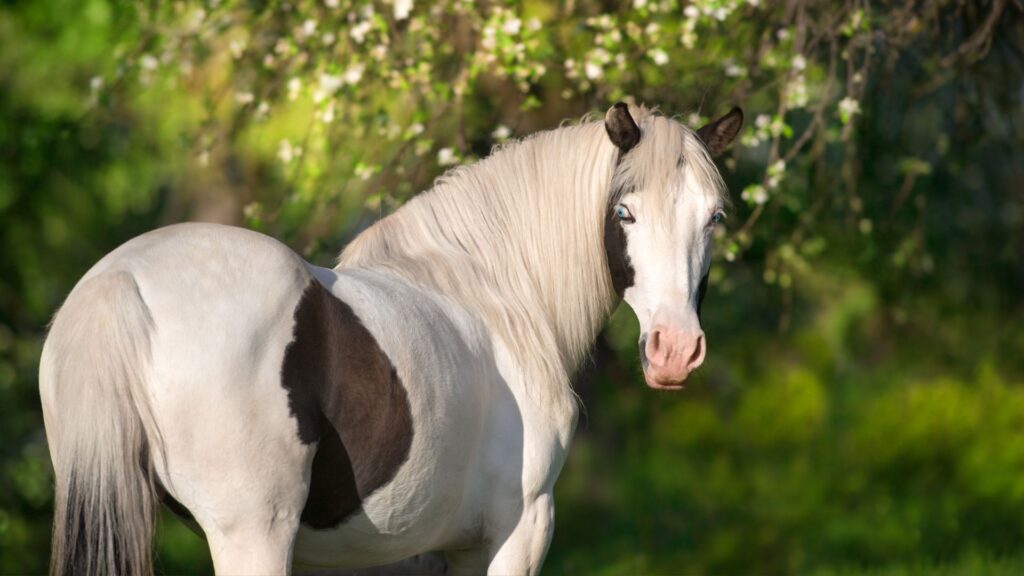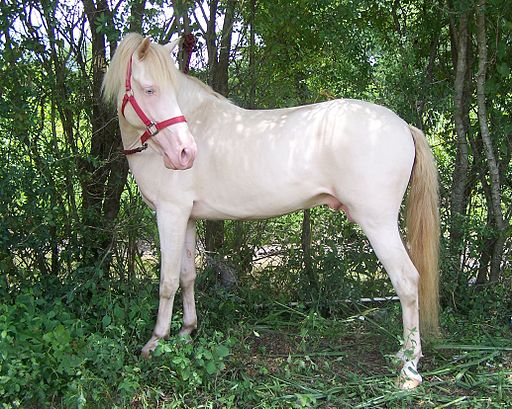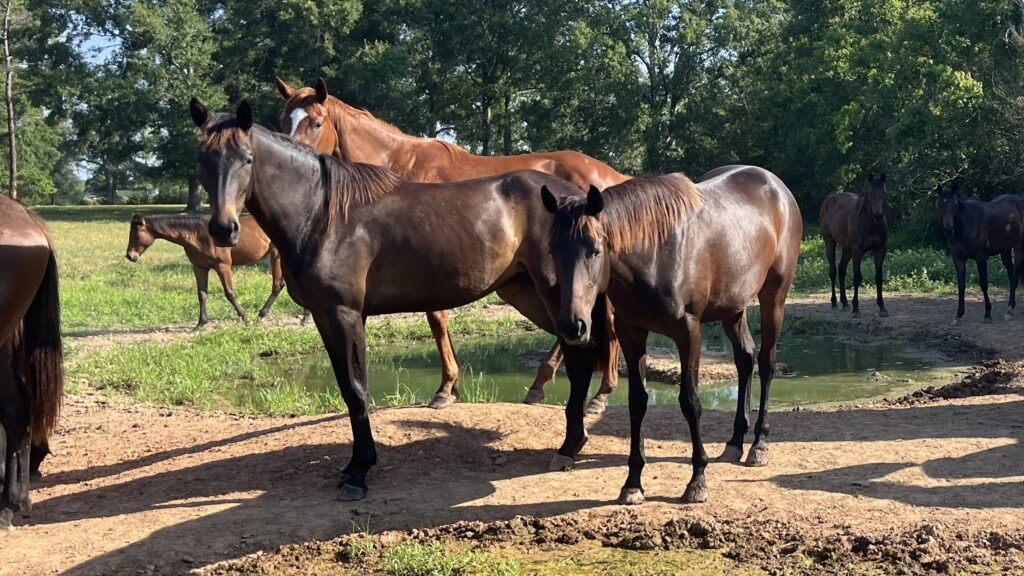Last updated: May 26, 2025
Picture this: a horse galloping across an open field, its mane flowing in the wind and… piercing blue eyes staring back at you. It’s a sight that stops you in your tracks, a rare beauty that few horses possess.
As a lifelong horse lover, I’ve been lucky enough to experience this firsthand. My childhood paint horse, with his striking blue eyes, sparked a fascination that has stayed with me to this day. And I know I’m not alone.
If you’ve ever wondered which horse breeds are known for their blue eyes, the genetics behind this captivating trait, or even how to best care for these special horses, you’re in the right place. Let’s dive into the world of blue-eyed horses and uncover the secrets behind their unique eye color.

Horse Breeds Known for Blue Eyes
Certain horse breeds are more predisposed to having blue eyes due to specific genetic traits. Let’s explore some of the most prominent ones:
- Appaloosa: Renowned for their distinctive spotted coat patterns, Appaloosas are also strongly associated with blue eyes. The complex genetics behind their coat patterns often influence eye pigmentation, leading to a higher likelihood of blue eyes in this breed.
- American Paint Horse: Similar to Appaloosas, Paint Horses with extensive white markings on their faces, particularly around the eyes, have a greater chance of sporting blue eyes. This is due to the connection between white markings and reduced melanin production in the iris.
- Gypsy Vanner Horse: These majestic horses, known for their feathered legs and flowing manes, occasionally exhibit blue eyes, adding to their striking appearance. While not as common as in Appaloosas or Paints, blue eyes are a cherished trait in Gypsy Vanners.
- Other Breeds: Although less frequent, blue eyes can also occur in other breeds, including Quarter Horses, Thoroughbreds, and Arabians. In these breeds, blue eyes are often associated with specific genetic lines or the presence of white markings.
You might come across blue-eyed horses in breeds or crossbreeds that might surprise you! A registry for them was established to understand these unique animals, the Blue-Eyed Horse Association (BEHA.

The Genetics of Blue Eyes in Horses
Understanding the genetics behind blue eyes in horses requires a brief overview of eye color inheritance:
- Basic Eye Color Genetics: In horses, as in humans, eye color is determined by the amount and type of melanin pigment in the iris. Higher melanin levels result in brown eyes, while lower levels lead to green, hazel, or blue. Source Veterinary Genetic Laboratory, UC Davis.
- The “Blue Eye” Gene: While the exact genetic mechanisms are still being researched, studies suggest that blue eyes in horses are linked to specific genes that influence melanin production in the iris. These genes may interact with other genes responsible for white markings, increasing the likelihood of blue eyes.
- Connection to White Markings: White markings on a horse’s face, especially around the eyes, are often associated with blue eyes. This is because the same genes that cause depigmentation of the skin and hair can also affect the iris, leading to reduced melanin and a blue appearance.

Care and Considerations for Blue-Eyed Horses
Horses, regardless of eye color, require attentive care. However, some wonder if there are extra steps or more precautions to consider when it comes to blue-eyed horses. Generally, the care regimen for blue-eyed horses doesn’t differ significantly from other horses.
Their vision is similar to their brown-eyed counterparts, and their eyes don’t necessarily indicate any underlying health issues. But, like all animals with lighter pigmentation, a few nuances are worth noting.
- Shade and Shelter: On particularly sunny days, ensure your blue-eyed horse can access shade. A simple tree shade, barn, or lean-to can offer relief from the intense sun.
- Fly Masks: A UV-protective fly mask can serve a dual purpose. It can protect the horse’s eyes from harmful UV rays and keep irritating flies away. Some masks are specifically designed to offer more sun protection, which can be a beneficial investment for blue-eyed horses.
- Regular Vet Checks: While this is a standard recommendation for all horses, it’s always a good practice to have a veterinarian check your horse’s eyes during regular visits. They can spot any potential issues early on.
- Avoid Direct Sunlight Exposure: Avoid prolonged exposure to direct sunlight, especially during peak hours. Consider scheduling activities like riding or training either early in the morning or later in the afternoon.
- Cleanliness: Keep the area around the eyes clean. This will reduce the risk of infections or irritations, which could be more evident with a blue eye.

Separating Fact from Fiction About Blue-Eyed Horses
Misinformation and myths often cloud the truth about these captivating creatures. Let’s set the record straight and separate fact from fiction.
Myth 1: Blue-eyed horses are more prone to blindness.
Truth: This is a common misconception. A horse’s eye color, whether blue, brown, or hazel, has no bearing on its vision quality or susceptibility to blindness.
Myth 2: Blue eyes are a sign of inbreeding.
Truth: Blue eyes are primarily a result of specific genetic patterns associated with certain coat colors, not inbreeding. These patterns can appear in any breed, regardless of their breeding history.
Myth 3: Horses with blue eyes have a certain temperament.
Truth: There is no scientific evidence linking eye color to temperament in horses. A horse’s personality is shaped by various factors, including breed, upbringing, training, and individual personality, not just eye color.
Myth 4: Blue-eyed horses can’t handle sunlight as well.
Truth: While horses with lighter-colored eyes may experience slightly more sensitivity to bright light, it doesn’t mean they can’t tolerate sunlight. Providing shade and using fly masks with UV protection can ensure their comfort on sunny days.

FAQs about Horses with Blue Eyes
Are blue-eyed horses rare?
Yes, blue eyes are relatively rare in horses, adding to their allure.
Are blue-eyed horses more likely to have health problems?
No, eye color doesn’t directly cause health problems. However, a study suggests blue-eyed horses may have a slightly higher risk of ocular squamous cell carcinoma (skin cancer affecting the eye).
Can any horse breed have blue eyes?
While more common in certain breeds, blue eyes can occur in any breed due to genetic variations.
Do blue-eyed horses require special care?
They may need extra protection from bright sunlight, but otherwise, their care is similar to other horses.
What causes blue eyes in horses?
Specific genes influencing melanin production in the iris, often linked to coat patterns, cause blue eyes.
Understanding these facts allows us to appreciate the beauty of blue-eyed horses without the misconceptions that often surround them.

Conclusion
Blue-eyed horses, with their unique genetic traits, hold a special place in the hearts of many horse enthusiasts. Their rarity and distinctive appearance make them stand out in any herd.
As we’ve explored, blue eyes in horses are a fascinating result of genetics, often linked to specific coat patterns. It’s important to remember that blue-eyed horses are just as healthy and capable as any other horse, and their eye color doesn’t dictate their temperament or personality.
If you’re fortunate enough to own or encounter a blue-eyed horse, take a moment to appreciate their unique beauty. And if you’re interested in learning more about these special equines, don’t hesitate to explore the resources provided or connect with other horse enthusiasts in your community.
Do you have a blue-eyed horse in your life? We’d love to hear about your experiences in the comments below! Remember, sharing your experiences and insights can further enrich this resource and foster community among horse lovers.
Below is a YouTube video of a blue-eyed Quarter horse.
If you’re captivated by blue-eyed horses, consider exploring these resources for further information:
- The Appaloosa Horse Club: https://www.appaloosa.com/
- The American Paint Horse Association: https://www.apha.com/
- Gypsy Vanner Horse Society: https://vanners.org/
- UC Davis Veterinary Genetics Laboratory – Coat Color Testing: https://vgl.ucdavis.edu/dna-tests/horse

About the Author: Miles Henry
Lifelong Horseman | Racehorse Owner | Published Author
Miles Henry brings over 25 years of hands-on experience training and owning Thoroughbred racehorses. Raised with Quarter Horses and Appaloosas, he’s spent a lifetime learning from horses—on the track, in the barn, and in the field. Today, he runs a small but successful racing stable in Louisiana and shares real-world insights on HorseRacingSense.com, helping horse owners, fans, and bettors navigate the sport with confidence.
📚 Books: View Miles’s books on Amazon »
🎧 Podcast Guest: Animal Tales Ep. 32 |
YouTube Interview
📩 Newsletter: Sign up for racing tips and horse care advice »
🔗 Follow Miles:
Twitter |
Facebook |
YouTube


